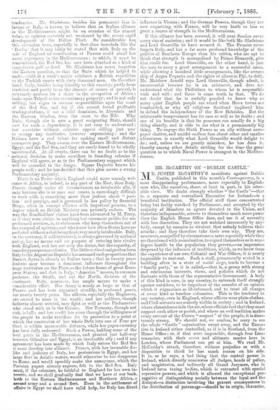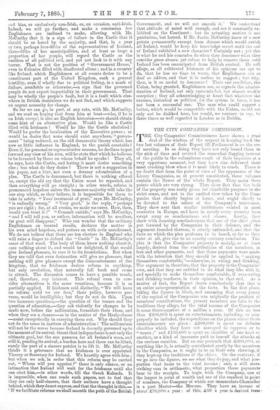MR. McCARTHY ON " DUBLIN CASTLE."
MR. JUSTIN McCARTHY'S manifesto against Dublin Castle, published in this month's Contemporary, is a most disappointing performance, more especially to Englishmen who, like ourselves, share, at least in part, in his ostensible view. We doubt strongly whether " the Castle "—that is, a separate and centralised Executive for Ireland—is a beneficial institution. The official staff there concentrated being but feebly watched by Parliament, and accepted by the majority of Members as agents devoted to the Union, and therefore indispensable, accrete to themselves much more power than the English Home Office does, and use it of necessity with less discretion. They are not watched incessantly by anybody, except by enemies so virulent that nobody believes their attacks ; and they therefore take their own way. They are, moreover, compelled by circumstances, more especially while they are threatened with assassination, to regard themselves as in some degree hostile to the population they govern,—an impression deepened by the influence of traditions, which, as we know from the experience of our own Colonial and War Offices, it is nearly impossible to root-out. Such a staff, permanently seated in a building often in a state of social siege, tends to become a " family party," as it is called,—that is, a group with strong and continuous interests, views, and policies which do not fluctuate with those of the representative Government. A body of this kind is sure, in any country, to entrench itself strongly against outsiders, to be impatient of the assaults of an opinion which it stigmatises as ill-informed, and to treat all charges of every kind as baseless calumnies. This is the tendency in any country, even in England, where officers wear plain-clothes, and Civil servants are scarcely visible in society ; and in Ireland, where clannishness is in the air, where officials feel that they must support each other or perish, and where an evil tradition makes every servant of the Crown " suspect " of the people, it is disastrously strong. We should not, we confess, be sorry to see the whole "Castle." organisation swept away, and the Executive in Ireland either controlled, as it is in Scotland, from the Home Office ; or, if that were impossible, through four Lieutenancies, with their nexus and ultimate master here in London, where Parliament can get at him. We read Mr. McCarthy's attack, therefore, without prejudice or with a disposition. to think he has much reason on his side. It is, as he says, a bad thing that the central power in Ireland, which directly nominates all Judges, heads of police, and magistrates, and indirectly all Grand Jurymen, who in Ireland form taxing bodies, which is entrusted with special repressive powers, and which is allowed the .exceptional prerogative of distinguishing socially between the loyal and the disloyal—a distinction involving the gravest consequences in the distribution of patronage—should be in origin, character, and bias, so exclusively non-Irish, or, on occasion, anti-Irish. Indeed, we will go further, and make a concession few Englishmen are inclined to make, allowing with Mr. McCarthy that it is a sign of failure in the. Castle that it should be so hated by the majority, and that, in a year or two, perhaps four-fifths of the representatives of Ireland, three-fifths of her municipalities, and at least as large a proportion of her people, will regard the Castle as the emblem of all political evil, and yet not look to it with any terror. That is not the position of " Government House," even in Colonies filled with disaffected aliens ; and in a country like Ireland, which Englishmen at all events desire to be a constituent part of the United Kingdom, such a general hostility, even if wholly due to political feeling, is a mark of failure, avoidable or otherwise,—a sign that the governed people do not expect impartiality in their government. That may be wholly the people's fault, but it is a fault which elsewhere in British dominions we do not find, and which suggests an urgent necessity for change.
So far we can go, in part, at any rate, with Mr. McCarthy, and we read on hoping that from him at least—who, if he is an Irish enrage, is also an English historian—we should obtain some hint of an alternative plan. Would he like a Castle filled with Irishmen ? Would he like the Castle abolished ? Would he prefer the localisation of the Executive power ; or would he desire that none should exist anywhere, " government " being reduced, on the old democratic theory which has now so little influence in England, to the parish constable ? Even if, for personal or representative reasons, he declines to put forward any view of his own, will he state that which he believes to be favoured by those on whose behalf he speaks ? They all, he says, hate the Castle, and hating it must desire something else ; but what do they desire ? There is not a suggestion in his paper, not a hint, not even a dreamy adumbration of a plan. The Castle is denounced, but there is nothing offered us, except the old cry that the Union must be repealed, and then everything will go straight ; in other words, reform is pronounced hopeless unless the immense majority will take the one step which, as they believe, it is impossible for them to take in safety. " Your treatment of gout," says Mr. McCarthy, " is radically wrong." " Very good," is the reply, " perhaps you are right ; for, at all events, we make no cures. How, then, would you treat it ?" " Commit suicide," says Mr. McCarthy, " and I will tell you, or rather, information will be needless, for gout will disappear." Who can Wonder that the ordinary Englishman so treated recoils, declares the matter in his own mind hopeless, and potters on with evils unredressed. We do not believe that there are ten electors in England who will raise a finger to defend the " Castle " in Mr. McCarthy's sense of that word. The body of them know nothing about it, care nothing about it, and would be delighted, if that would give Ireland pleasure, to raze it to its foundations. But when they are told that even destruction will give no pleasure, that nothing will give pleasure except the dismemberment of the kingdom, that no Irishman desires reform in anything, but only revolution, they naturally fall back and cease to attend. The discussion ceases to have a possible result, and, therefore, any interest. This refusal even to consider alternatives is the more vexatious, because it is so partially applied. If Irishmen said distinctly, "We will have no reform until we are free," their policy, however perverse, would be intelligible; but they do not do this. Upon two immense questions,—the question of the tenure and the question of education,—they ask violently for changes to be made now, before the millennium, formulate their ideas, and when they see a chance—as in the matter of the Healy-clause —assist energetically in carrying them out. Why should they not do the same in matters of administration ? The millennium will not be the worse because Ireland is decently governed up to the moment of its arrival. Grant that independence is not only the ultimate goal, but the one panacea for all Ireland's woes, and still if, pending its arrival, a burden here and there can be lifted, surely the part of a sincere patriot is to lift it. Mr. McCarthy thinks it a grievance that no Irishman is ever appointed Viceroy or Secretary for Ireland. We heartily agree with him ; but when we ask, in order that this reform may be carried out, " Whom will you appoint ?" there is only silence, or an intimation that Ireland will wait for the Irishman until she can elect him,—in other words, till the Greek Kalends. It is impossible, when one reads such papers, not to feel that they are only half-sincere, that their authors have a thought behind, which they do not express, and that the thought is this,— If we facilitate reforms we shall smooth the path of the British Government, and we will not smooth it." Wo understand that attitude. of mind well enough, and see it constantly exhibited on the Continent ; but its actuating motive is not patriotism, but hatred. If Mr. Justin McCarthy knew of a new potato permanently exempt from disease which would enrich all Ireland, would he keep his knowledge secret until the soil of Ireland exhibited a new character ? Certainly not ; yet this is what he and his comrades do when they denounce what they consider gross abuses, yet refuse to help to remove them until Ireland has been emancipated from British control. lie will allege, as all cultivated Irishmen of his opinions are apt to do, that he has no time to waste, that Englishmen are as deaf as adders, and that it is useless to suggest ; but why, then, is it so useful to denounce ? Their one condition, the Union, being granted, Englishmen are, as regards the administration of Ireland, not only open-minded, but almost weakly receptive ; they all acknowledging at heart that whatever the excuses, historical or political, for the system in force, it has not been a successful one. The man who could suggest a better, which would be compatible with the Union, would not only not be disliked here, but would, we venture to say, be three times as well regarded in London as in Dublin.



































 Previous page
Previous page